Hydrogen gas helps with post-cardiac arrest syndromeScientific Research

Feasibility and Safety of Hydrogen Gas Inhalation for Post-Cardiac Arrest Syndrome – First-in-Human Pilot Study –
Abstract
Background
Hydrogen (HI) inhalation improves brain and cardiac dysfunction in an animal model of post-cardiac arrest syndrome (PCAS). HI in human patients with PCAS has never been studied.
METHODS AND RESULTS
Between January 2014 and January 2015, 21 of 107 out-of-hospital cardiac arrest patients achieved spontaneous cardiac recovery. After excluding 16 patients with specific criteria, 5 patients underwent HI and target temperature management (TTM). No adverse events related to HF were observed, and 4 patients survived for 90 days with favorable neurological outcomes.
Conclusion
HI combined with TTM is a feasible treatment for PCAS patients. (Circ J 2016;80:1870-1873)
References
DOI: 10.1161
Published on: 25/07/2023
Feasibility and Safety of Hydrogen Gas Inhalation for Post-Cardiac Arrest Syndrome – First-in-Human Pilot Study –
Abstract
Background
Hydrogen (HI) inhalation improves brain and cardiac dysfunction in an animal model of post-cardiac arrest syndrome (PCAS). HI in human patients with PCAS has never been studied.
METHODS AND RESULTS
Between January 2014 and January 2015, 21 of 107 out-of-hospital cardiac arrest patients achieved spontaneous cardiac recovery. After excluding 16 patients with specific criteria, 5 patients underwent HI and target temperature management (TTM). No adverse events related to HF were observed, and 4 patients survived for 90 days with favorable neurological outcomes.
Conclusion
HI combined with TTM is a feasible treatment for PCAS patients. (Circ J 2016;80:1870-1873)
References



